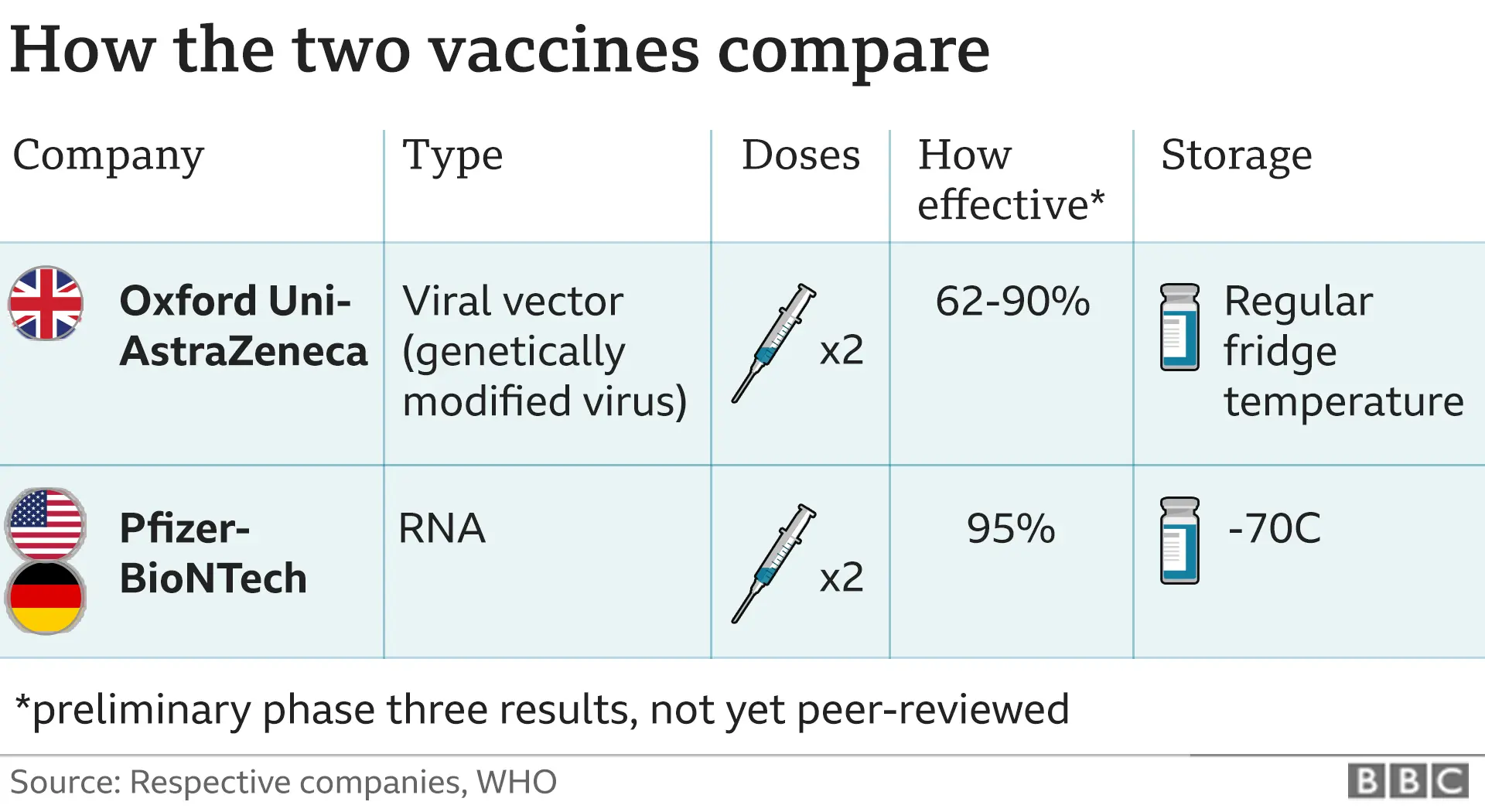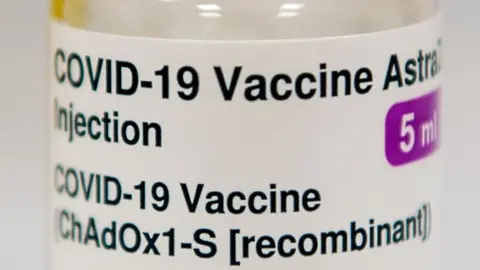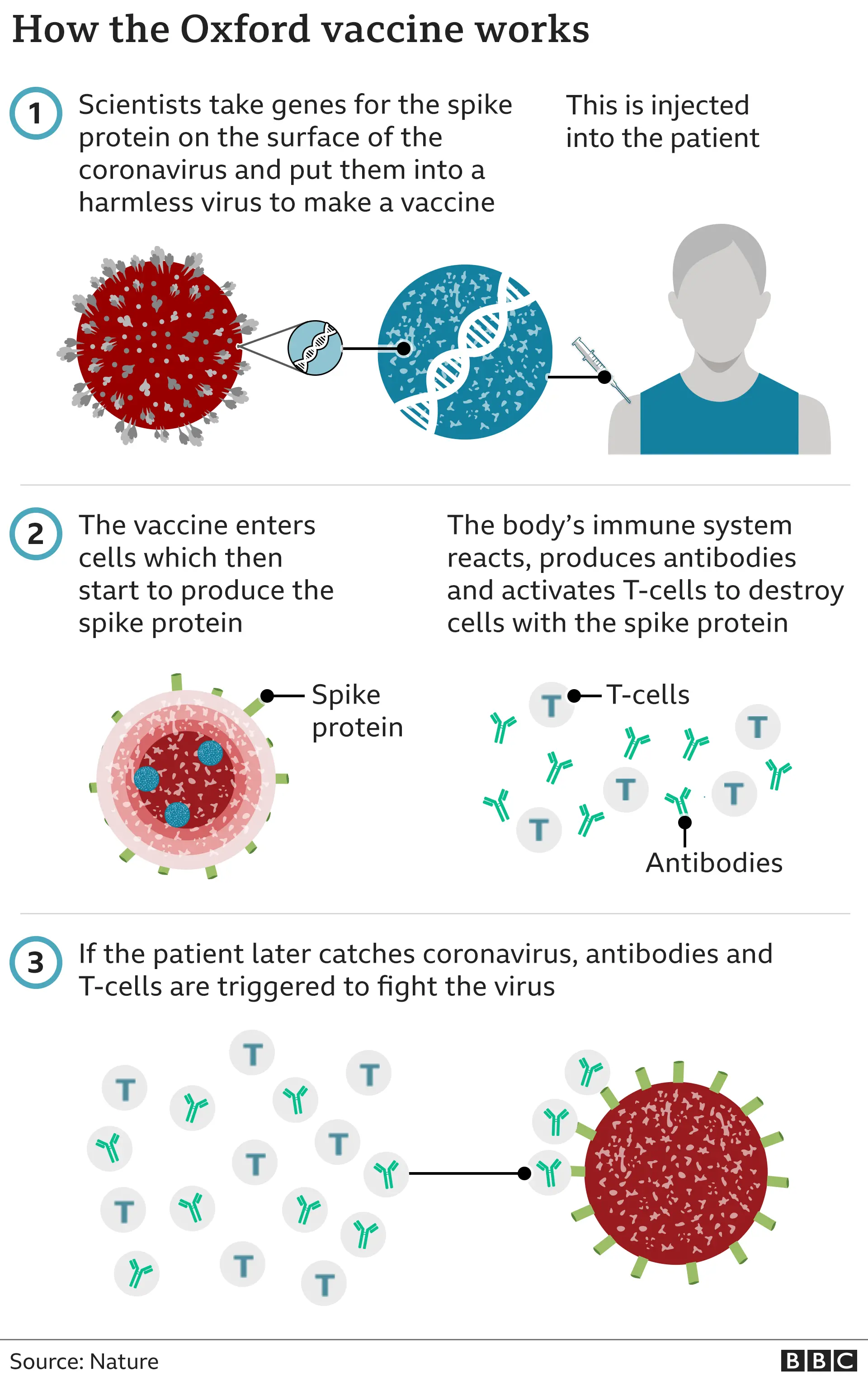Covid-19: Oxford-AstraZeneca vaccine rollout begins in Northern Ireland
Up to 11,000 people aged over 80 across Northern Ireland are set to receive the Oxford-AstraZeneca vaccine this week.
The aim is to ensure everyone in that age group will be offered the vaccine by the end of January.
Thirty GP practices will be administering 50,000 doses of the vaccine, which was approved for use in the UK on 30 December.
It is the second vaccine to be approved in the battle against coronavirus in Northern Ireland.
It comes ahead of a UK-wide announcement by the prime minister, set to be made at 20:00 GMT on Monday, in which further restrictions will be announced.
In a statement, a No 10 spokesman said the new variant of Covid-19 had "led to rapidly escalating case numbers across the country" and "further steps must now be taken to arrest this rise".
On Monday, Northern Ireland recorded a further 1,801 Covid-19 cases and 12 more virus-related deaths.
These latest figures from the Department of Health bring the total number of deaths to 1,366, while 79,873 people have tested positive for the virus since the pandemic started.
More than 12,000 cases have been reported in the past seven days, more than double the week before.
The seven-day rate per 100,000 people is now 660 positive cases, compared to 200 per 100,000 two weeks ago.
Medical experts believe that is down to the two-week easing of restrictions over the Christmas period.
In the Republic of Ireland on Monday, an additional 6,110 confirmed cases of Covid-19 were announced, with six further deaths linked to the virus.
Northern Ireland is in the second week of a six-week lockdown in which non-essential retail is closed.
The first doses of the vaccine were given delivered at a GP surgery on the Falls Road in West Belfast on Monday afternoon.
The first person in Northern Ireland to receive the Oxford/AstraZeneca coronavirus vaccine was 94-year-old Eileen Lynch.
Speaking after receiving the vaccine, Ms Lynch said she was "delighted and privileged" to receive it.
"I feel like I can really look forward to the year ahead now that I have been vaccinated," she said.
The Pfizer-BioNTech Covid-19 vaccine has already been used to vaccinate care home residents and staff.
By mid December, 50,000 doses of that vaccine had been made available and by 30 December, Northern Ireland's Department of Health reported that 33,000 people had been vaccinated.
This included 8,940 care home residents, 10,484 care home staff and 14,259 health and social care staff.
According to the latest NI statistics, for the first time the percentage positive cases in the over 80s is down - an indication the vaccination process is working.


There are approximately 82,000 people over 80 in NI and BBC News NI understands that if deliveries of the Oxford-AstraZeneca vaccine happen as planned, it is thought that all of those over 80, as well as GPs and their staff, could be vaccinated within three weeks.
While 50,000 doses have been delivered to Northern Ireland, a further 23,000 vaccines are expected on 19 January while another 68,000 are due on 24 January.
Dr Alan Stout, who is a GP in Belfast, told BBC News NI that members are "very optimistic" that 11,000 people can be vaccinated this week.
 PA Media
PA MediaNI's chief medical officer said the Oxford-AstraZeneca rollout would run alongside the ongoing vaccination programme.
Dr Michael McBride said: "First and foremost we must act to protect those most at risk of severe disease and death.
"The evidence shows that the initial dose of vaccine offers as much as 70% protection against the effects of the virus.
"Providing that level of protection on a large scale will have the greatest impact on reducing mortality and hospitalisations, protecting the health and social care system."
The Pfizer-BioNTech Covid-19 vaccine has to be kept at an extremely low temperature which complicates handling constraints.
The Oxford-AstraZeneca vaccine is considered easier to store and distribute.
Its rollout consists of two full doses of the vaccine, with the second dose to be given four to 12 weeks after the first.
GPs are appealing to the public to remain calm and wait to be called for their vaccine either by telephone or by letter.
Dr Stout said as demand grows worldwide for the vaccine, that schedule could easily change.
"The public have to be patient, we have a system and must be allowed to get on with it - it really is 'don't call us - we will call you'."
While some vaccinations will take place in surgeries others will happen in a drive-through system.


Covid-19 is deadlier than flu, which means January 2021 is going to be even tougher than usual.
Also, Covid patients tend to stay much longer in hospital with more severe symptoms requiring additional beds and care.
But those rising patient numbers aren't matched by an increased workforce.
Instead it is expected that the nurse-patient ratio will increase (even though many aren't trained to work in critical care) as there simply aren't enough nurses available.
Some health unions fear this will only add to Northern Ireland's excess mortality rate, which is greater than that in Great Britain.
Once again, this highlights Northern Ireland's failing health care system, which was already below par well before the start of the pandemic.
Coronavirus infection figures here are expected to peak between 15 and 21 January. That will be felt not only in hospitals but also in GP practices as they continue to roll out the vaccine.
While at this stage the six weeks look bleak it's hoped that the additional Astra-Zeneca vaccine and the low incidence of flu will go a long way in not only saving lives, but also protecting the health service.

Dr Stout said much planning had gone into ensuring the programme happened as smoothly as possible.
"People will literally stay in their cars and be asked to roll up their sleeves - it has to be safe and efficient in order for us to get through it and safely."
The UK has ordered 100 million doses of the new vaccine - enough to vaccinate 50 million people.
Meanwhile, Dr Tom Black, chair of the British Medical Association in Northern Ireland, said it was "appalling" that the Pfizer vaccine was not to be administered in two doses within 21 days as instructed by the company and threatened legal action.
Dr Black was responding to news that the UK will give both parts of the Oxford and Pfizer vaccines 12 weeks apart.
"They have left care workers in Northern Ireland with a gap in their expected immunity," he told BBC NI's Radio Foyle on Monday.
"In that period doctors, nurses, porters or health care professionals could infect patients because they will not be protected against the transmission of the infection to patients."
The UK's chief medical officers have defended their Covid vaccination plan.
They said getting more people vaccinated with the first jab was "much more preferable" and that the great majority of the initial protection from clinical disease is after the first dose of vaccine.
Dr Black is to meet NI Health Minister Robin Swann later to express health care workers' concern over the change in vaccine policy.



- TEACHERS: Are they are at risk with schools reopening?
- SOCIAL DISTANCING: What are the rules now?
- SUPPORT BUBBLES: What are they and who can be in yours?
- FACE MASKS: When do I need to wear one?
- LOOK-UP TOOL: How many cases in your area?

